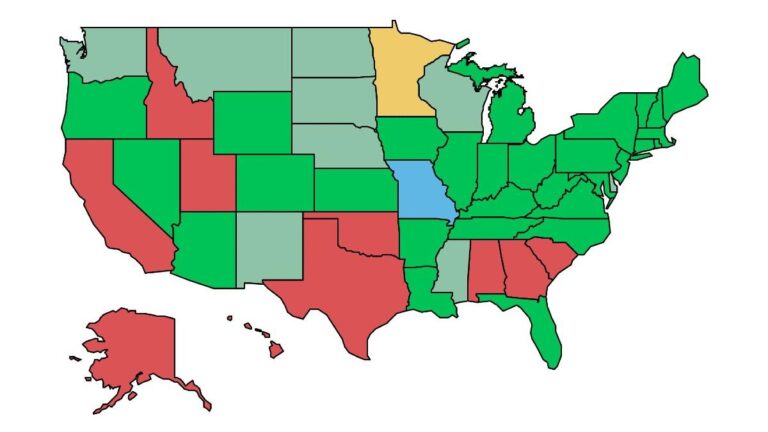Across the United States, a growing number of states are moving to tighten regulations on sports betting, signaling a shift toward more stringent oversight of the rapidly expanding industry. As sports wagering continues to gain popularity and generate notable revenue, lawmakers and regulators are responding with measures aimed at bolstering consumer protections, increasing clarity, and addressing concerns over betting integrity. This wave of regulatory tightening reflects the evolving landscape of legalized sports betting and the challenges states face in balancing growth with responsible governance.
States Seek Stricter Compliance Measures to Curb Illegal Betting Activities
State governments across the US are intensifying efforts to enhance the integrity of their betting markets by imposing more rigorous compliance protocols. Lawmakers and regulatory bodies have expressed growing concerns about the surge in illicit betting platforms that evade existing oversight, posing risks to consumers and the legitimacy of sports wagering.Among the measures under consideration are mandatory real-time reporting of bets, enhanced background checks on operators, and stricter licensing requirements designed to close loopholes currently exploited by illegal operators.
Officials emphasize that cracking down on underground betting is essential not only to protect bettors but also to safeguard state revenues generated from legal sportsbooks.To illustrate the widening gap between legal and illegal operations, consider the following table outlining compliance challenges and proposed initiatives:
| Compliance Challenge | Proposed Initiative | Expected Impact |
|---|---|---|
| Lack of Transparent Reporting | Real-time Bet Monitoring Systems | Improved Detection of Illegal Activity |
| Weak Operator Vetting Procedures | Comprehensive Background Checks | Reduced Entry of Rogue Operators |
| Loosely Defined Licensing Rules | Stricter Licensing Criteria | Higher Accountability and Compliance |
Industry stakeholders have also been called to cooperate more closely with regulators to bolster transparency and consumer protections, signaling a unified front against unauthorized betting networks. This push for enhanced oversight reflects a broader trend toward safeguarding sports integrity while preserving the economic benefits that legalized betting brings to states.
Impact of Enhanced Regulations on Sportsbook Operators and Market Competition
Enhanced regulatory frameworks are reshaping the operational landscape for sportsbook operators nationwide, introducing a new set of challenges and opportunities. Stricter compliance mandates compel businesses to invest considerably in technology upgrades, enhanced security protocols, and transparent reporting systems. These adjustments, while possibly increasing operational costs, aim to protect consumers and foster responsible gambling practices. Consequently, operators are compelled to re-evaluate their business models, with an increased emphasis on ethical standards and risk management.
Market competition is also witnessing a significant shift under these tightened regulations. Smaller operators may find barriers to entry rising,which could inadvertently consolidate market share among established players with deeper resources.However, the regulatory environment promotes fairness by leveling the playing field through:
- Standardized licensing requirements
- Transparent advertising guidelines
- Uniform taxation policies
- Consumer data protection rules
| Factor | Before Regulation | After Regulation |
|---|---|---|
| Licensing Cost | Moderate | High |
| Market Entrants | High | Reduced |
| Consumer Protection | Limited | Enhanced |
| Operator Consolidation | Low | Increasing |
Balancing Consumer Protection and Industry Growth in Expanding Sports Betting Markets
As states race to capitalize on the burgeoning popularity of sports betting, lawmakers face the challenge of implementing regulations that safeguard consumers without stifling industry innovation.Increasingly, regulations aim to address concerns such as underage gambling, problem betting behaviors, and transparency in odds reporting while enabling operators to expand and innovate.Enhanced licensing requirements, mandatory self-exclusion programs, and real-time monitoring tools are becoming industry standards to create a safer betting environment. This regulatory evolution reflects a growing consensus that consumer protection must go hand-in-hand with market growth.
Stakeholders emphasize collaborative frameworks that balance economic opportunities with responsible gaming. Industry leaders and regulators are exploring strategies that include:
- Implementing advanced analytics for detecting suspicious betting patterns
- Mandating clear disclosures on betting risks
- Establishing state-funded education and support programs
These efforts represent a shift toward a more sustainable sportsbook market, where innovation thrives through trusted regulation, fostering long-term growth.
| State | Consumer Protection Focus | Industry Growth Strategy |
|---|---|---|
| New Jersey | Mandatory ID verification | Flexible licensing model |
| Pennsylvania | Self-exclusion programs | Tax incentives for startups |
| Colorado | Real-time bet monitoring | Partnerships with local casinos |
Recommendations for Policymakers to Ensure Transparent and Responsible Gambling Practices
Policymakers must prioritize transparency and accountability when crafting new gambling regulations to protect consumers and uphold public trust. Ensuring that betting operators disclose clear odds, payout rates, and potential risks can empower bettors to make informed decisions. Additionally, mandating regular third-party audits and public reporting on compliance can deter unethical practices and promote a level playing field across the industry.
Equally crucial is the implementation of robust responsible gambling frameworks that actively prevent addiction and minimize harm. Recommendations include:
- Integrating mandatory self-exclusion programs and real-time monitoring of betting behavior.
- Requiring operators to provide accessible resources for counseling and support services.
- Enforcing strict advertising standards to prevent targeting vulnerable populations.
- Collaborating with public health experts to develop data-driven intervention strategies.
| Policy Focus | Key Actions |
|---|---|
| Transparency | Mandate clear disclosure and autonomous audits |
| Responsible Gambling | Implement self-exclusion and real-time behavior tracking |
| Public Awareness | Promote educational campaigns and support services |
Concluding Remarks
As states continue to navigate the complexities of regulating a rapidly expanding sports betting market,lawmakers face the ongoing challenge of balancing consumer protection with industry growth. The movement toward tighter regulations reflects increasing concerns over integrity, transparency, and the prevention of problem gambling. With varying approaches across jurisdictions, the evolving landscape of sports wagering underscores the critical role that legislative oversight will play in shaping the future of legal betting in the United States. Stakeholders and observers alike will be watching closely as these regulatory efforts unfold in the months and years ahead.




